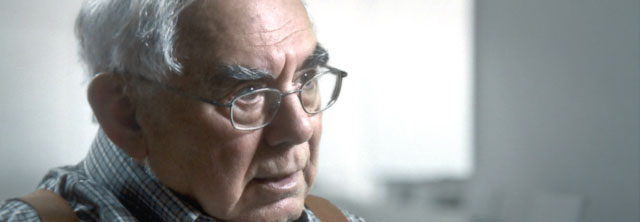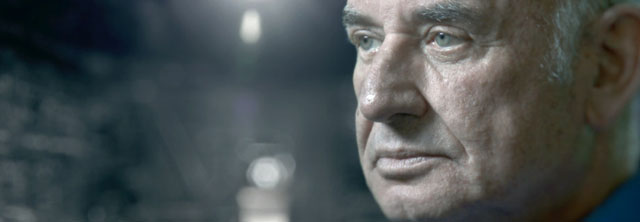“The Gatekeepers, a new documentary by the Israeli director Dror Moreh, consists of interviews with six men, all of them retired, most of them bald, one of them a grandfatherly type, well into his 80s, in suspenders and a plaid shirt,” begins A.O. Scott in the New York Times. “They reminisce about past triumphs and frustrations, but Mr. Moreh’s amazing, upsetting film, which opens Monday for a weeklong awards-qualifying run in advance of a wider release next year, is the opposite of nostalgic. It is hard to imagine a movie about the Middle East that could be more timely, more painfully urgent, more challenging to conventional wisdom on all sides of the conflict.”
After screening at Telluride and Toronto, The Gatekeepers played at the New York Film Festival last month, when the NYT‘s Manohla Dargis wrote: “Mesmerizingly cinematic and politically complex, this documentary jaw-dropper movie explores, with depth and nail-biting intensity, Israel’s history, present and future through the eyes of six former heads of the internal security agency Shin Bet. It’s an elegant weave of talking-head interviews and archival material, including shocking images from counterterrorism missions, but mostly it’s an argument for reform coming from six men whose love of their homeland is as naked as their loathing for its politicians.”
“Different personalities and philosophies are revealed,” writes Eric Hynes in Reverse Shot, “but it’s the ways in which the interviews overlap, in which these strong-willed voices coalesce into a mournfully prophetic chorus, that makes the film such an astonishing, and essential, document. The power of Moreh’s film lies not in its subjects’ contrition, but in their collective cynicism, their shared sense of futility. The film proceeds in a roughly chronological fashion from 1967’s Six-Day War, which expanded the boundaries of Israel and began the nation’s modern era of Palestinian occupation, through the rise of terrorism in the 70s, the First Intifada in the 80s, the failed peace process of the 90s, the Second Intifada in the aughts, and up to the present day; along the way numerous notorious events are recounted in detail, from the Bus 300 affair to Yithzak Rabin’s assassination and numerous ‘targeted assassinations’ of Palestinian terrorists. According to Avraham Shalom, who served as Shin Bet director from 1981–86, serious considerations of a Palestinian state vanished with the rise of terrorism, which became both the focus of the agency and the excuse for more intense and emboldened occupation. It was important, he says, to have to contend with a ‘low flame’ of terrorism, ‘so that we could do what we want.'”
“The picture of Shin Bet that emerges is one of an organization equally brutal and bungling, both contributing and responding to Israel’s crises with Palestine (and the Arab world more generally) in a manner that’s equally brutal and bungling.” John Semley in Slant: “‘Politicians prefer binary options,’ offers one of the Shin Bet heads early in the film, a bit of buck-passing that typifies their attempts at on-camera absolution. Later, another smirks and says that as he grew older, and retired from the counter-terrorism game, his allegiances softened and he became a ‘leftist.’ What a luxury!”
Kiva Reardon in Cinema Scope: “Politically, the film clearly aligns itself with the Israeli left—anti-settlement, for a Palestinian state, frustrated with the stagnation of the peace process—though the disarmingly frank (and sometimes truly surprising) statements from its subjects does raise the problematic issue (a la Errol Morris’s McNamara whitewash The Fog of War) of it serving as a cheaply purchased post-facto atonement/justification for careers premised on moral questionability. Where The Gatekeepers takes on a more provocative tone, however, is in its pointed attempt to draw parallels between Shin Bet and Nazi Germany, a theme that reaches its culmination when the most right-leaning ex-leader, Avraham Shalom, hesitantly says that he worries the cruelty of the Israeli anti-terror machine has been inherited from the horrors of their own history.”
More from David D’Arcy (Artinfo), Nikola Grozdanovic (Playlist), Eric Kohn (Indiewire), Todd McCarthy (Hollywood Reporter), Joshua Rothkopf (Time Out New York), Lisa Schwarzbaum (Entertainment Weekly), and Kenneth Turan (Los Angeles Times). And Sheerly Avni interviews Moreh for Forward.
Update, 12/2: “The movie is yet another proof that discussion of Israel’s behavior is much freer in Israel than it is here,” notes the New Yorker‘s David Denby. The interviewees “candidly discuss anti-terrorist operations (their main brief) and such methods as torture and targeted assassinations of Hamas leaders. They evince a withering contempt for the native extremists—Israel’s right-wing bomb-throwers—who wanted to blow up the Dome of the Rock, the holist of Islamic sites, in Jerusalem, an act that would have started a war conducted by all the world’s Muslims against Israel. They are ruthless, pragmatic, calculating, and yet, at times, astonished by their ability to pinpoint a missile or bomb attack against a single house or individual. They exercise power and—in retrospect, at least—question it at the same time…. They are masters of ‘tactics,’ but they know that ‘strategy’—the point of all these brilliant counterterrorism operations—may have eluded them, and has certainly eluded Israel’s leaders.”
For news and tips throughout the day every day, follow @KeyframeDaily on Twitter and/or the RSS feed. Get Keyframe Daily in your inbox by signing in at fandor.com/daily.





